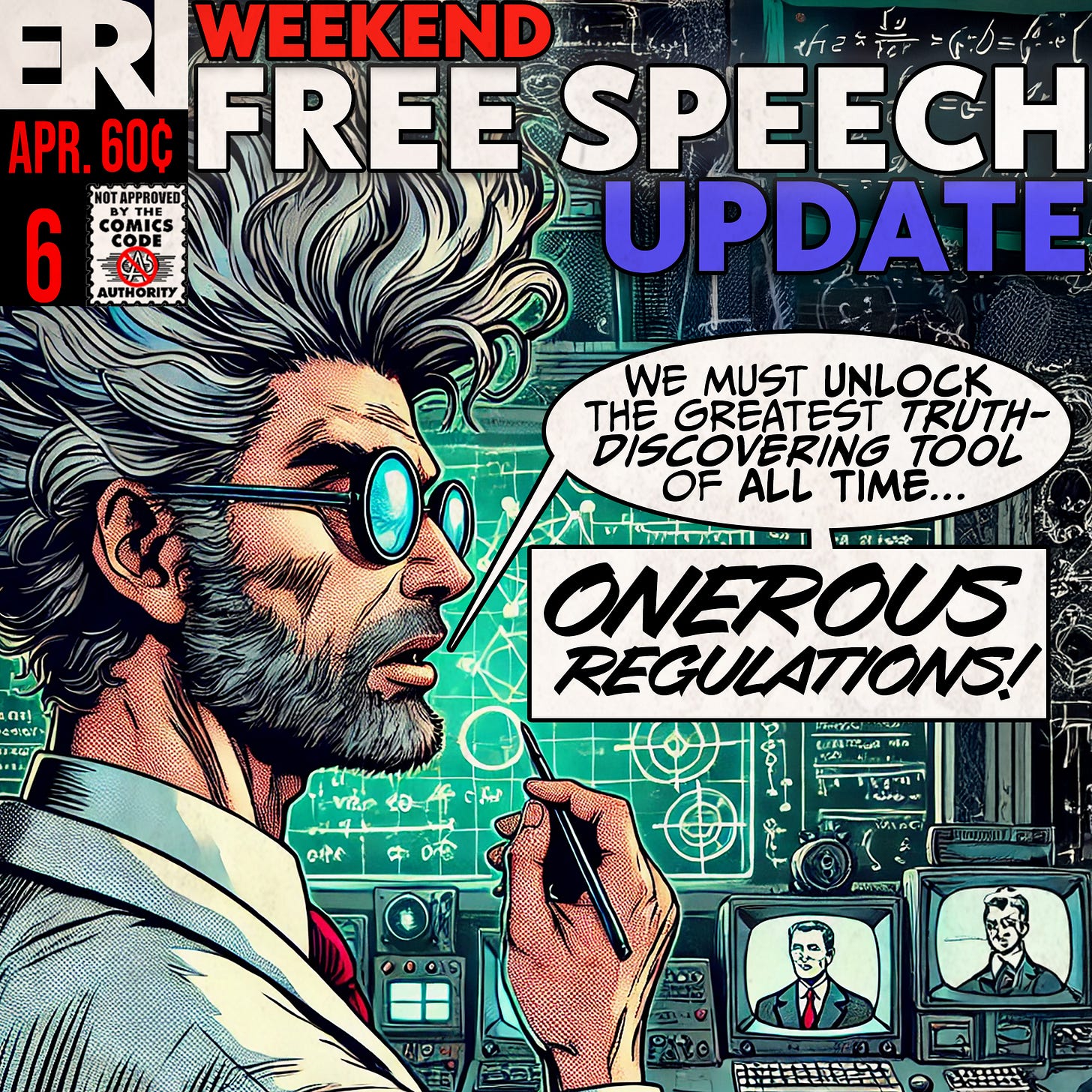Rikki on Real Time, the fight over AI regulation continues, ‘Canceling’ in paperback, & more!
Bringing you the latest free speech news (4/6/25)
Stories of the week
EXCLUSIVE: The Family of a Murdered Gaza Protester Speaks Out
(The Free Press) by Tanya Lukyanova (no relation)
For three straight days last week, thousands of courageous Palestinians took to the streets all across the Gaza Strip in the largest anti-Hamas demonstrations since October 7, 2023. Uday was part of those protests. But on Saturday, he took a step beyond. He stood up inside a coffee shop in Gaza City, and in a loud voice, denounced Hamas.
According to his family, a few hours later, around 30 armed men from the Qassam Brigades, Hamas’s military wing, stormed his home and dragged him away. His family says they tortured him for hours, until he was dead. When they were done—after they had broken his fingers, stabbed him repeatedly, and smashed his head with a rifle butt—they dropped his body off a rooftop. A note was pinned to his clothes: “This is the price for all who criticize Hamas.”
My co-author Rikki Schlott was on the Real Time with Bill Maher panel (alongside FIRE Advisory Council Member John McWhorter) on March 28 to help promote the paperback release of ‘The Canceling of the American Mind,’ due out April 29! Pre-order your copy now.
This week in FIRE’s blog
No president gets to decide who deserves a lawyer by Aaron Terr
Lawyers make easy targets. But freedom and protection of individual rights depend on their efforts to uphold the rule of law, check government overreach, and defend the unpopular. If you’re being prosecuted, suing the government for violating your rights, or challenging an unconstitutional law, you need a lawyer. And you shouldn’t have to worry about whether intimidation from the federal government will prevent you from getting one.
AI is new — the laws that govern it don’t have to be by Tyler Tone
The application of existing laws, to be sure, must comport with the First Amendment’s broad protections. Not all conceivable applications will be constitutional. But the core principle remains: states that are hitting the brakes and reflecting on the tools already available give AI developers and users the benefit of operating within established, predictable legal frameworks.
This week in ERI
How state AI regulations threaten innovation, free speech, and knowledge creation by Dean W. Ball, Adam Thierer, and me
London Calling: Ronnie’s First Amendment Roundup
While courts have preliminarily enjoined various state social media age-verification laws, including Arkansas’ Social Media Safety Act (SMSA), here’s the first permanent injunction in any of those cases, issued as to that law by the federal court in the Western District of Arkansas. The SMSA bars any social media company from having accounts for minors in Arkansas unless it gets express parental consent. To effectuate that, the law requires using a third-party vendor for age-verification via measures that include obtaining the account holder’s digital or other government-issued ID or “any commercially reasonable age verification method,” with those currently on market being biometric face or voice recognition (the law does not say, however, how social media are to identify an account-seeking minor’s parents to get consent, or how to verify that consent). As such, the SMSA bars social media access to minors whose parents do not consent and burdens access for all Arkansans by requiring adult users to produce state-approved ID and/or submit to biometric age-verification. This, the court holds, violates the First Amendment. The court rejects the tried-and-untrue government claim that social media restrictions somehow regulate only conduct not speech, and holds the SMSA is content-based and thus subject to the strictest constitutional review because (a) it exempts (among others) platforms that offer “news, sports, entertainment or other content … preselected by the provider and not user generated” and news websites with social features, and (b) it favors speech of whoever provides the online service over speech of users of online services – that is, it privileges institutional content creators (movie and TV studios, mainstream media outlets, and traditional journalists) over, for example, Soundcloud artists, TikTok chefs, and citizen journalists. The court then holds the SMSA cannot satisfy strict scrutiny because it is not narrowly tailored to serve a compelling state interest. The court “does not doubt … that unfettered social media access can and does harm minors” or that the state has a compelling interest in protecting them, but it “does not, however, have a free-floating power to restrict the ideas to which children may be exposed.” The court holds the SMSA cannot sufficiently achieve its stated purpose because it “cannot be regarded as protecting an interest of the highest order, and thus as justifying a restriction on truthful speech” to the extent “it leaves appreciable damage to that supposedly vital interest unprohibited.” Here, the state claims an interest in combating online exploitation of minors, but the SMSA exempts not only Google, WhatsApp, Omegle, and Snapchat – some of the services with the highest incidents of reports, of which some are also private-message focused despite that leading to “much of the mental health harms” it is claimed minors experience – but also gaming sites and video chat apps that are common places where adults engage in financial “sextortion” of minors. The court notes the law’s only constraint is a one-time blanket parental consent and the lack of evidence that a parent's involvement in account creation signals intent to be involved in the child's online experiences thereafter. Also, while the state cites “excessive data collection … use[d] to deliver harmful content and troves of paid advertising,” the law does not bar data collection from identified minors, and “instead seems to provide even more accurate age data to feed to algorithms.” SMSA is also not narrowly tailored, the court holds, given less restrictive means by which parents can exercise control over their minors’ online life, including whether to give them internet-capable devices in the first instance, and parental controls available at the online-service and device levels, as well as those some platforms offer for their own users. Separately, the court holds SMSA is unconstitutionally vague in failing to adequately define which entities are covered in making that depend on the “primary purpose” of a service—which is not only undefined but ambiguous as to whose “primary purpose” (the user or the company) matters—and in similarly relying on undefined terms like “substantial function of the service or application” and exclusions based on “predominant or exclusive function” to define the law’s scope. Here’s hoping the preliminary relief granted as to other states laws to similarly ripens into permanent injunctions.
International free speech stories of the week
Police review couple’s arrest in school WhatsApp row (BBC) Louise Parry
Canada MP quits election race over Chinese bounty comments (BBC)
Protest-shocked Hamas executes 6 Gazans, flogs people in public (India Today)
Quakers so incensed by ‘ridiculously heavy-handed’ police raid that they ‘didn't even offer officers a cup of tea’ (Daily Mail) by Katherine Lawton and Ciaran Foreman
Clips of the week
FIRE AC Member & Columbia professor John McWhorter weighs in on the problems at Columbia and the Trump administration’s recent actions against the school on Real Time with Bill Maher.
Also on Real Time, California Governor Gavin Newsom acknowledges the problem of cancel culture. It’s nice to see people no longer pretending cancel culture doesn’t exist (or worse, that it’s a good thing!) … looking at you, Michael Hobbes!






No. AI is bullshit. It has nothing to do with free speech and everything to do with bland shit after stealing others work.
https://open.substack.com/pub/marlowe1/p/special-pesach-membership-sale?utm_source=share&utm_medium=android&r=sllf3
Here’s some unpopular free speech for you to defend: I can’t stomach Bill Maher even for a minute. And I usually agree with him! So smug and supercilious.